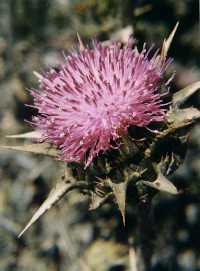News from
Thoreau Foods
May/June 2004
Volume 1, Number 2
“This afternoon I throw off my outside coat. A mild spring day. I must hie to the Great Meadows. The air is full of bluebirds. The ground almost entirely bare. The villagers are out in the sun, and every man is happy whose work takes him outdoors. I go by Sleep Hollow toward the Great Fields. I lean over a rail to hear what is in the air, Liquid with the bluebirds’ warble. My life partakes of infinity.”
Henry David Thoreau
March 15, 1852

Thoreau Foods
Susan & Peter
51 Cortland Lane
Boxborough, MA
01719
Phone:
(978) 266-8973
E-mail:
We’re on the Web!
New Product Line!
Smoothie Power Formulas
Thoreau Foods introduces a new Smoothie Power Formula line. These highly concentrated nutritional power formulas are great to mix into a smoothie or can be used as a topping on yogurt, cereal, dessert, salads or whatever! We use the most concentrated whole food ingredients in our cereal products, without the whole grains, nuts and fruit, to make these nutritional powerhouse formulas that give a real boost to your diet.
The Omega 3 Power Formula contains 100% of the daily recommended allowance of Omega 3 essential fatty acids in only 2 tablespoons. It is a great way to get your Essential Fatty Acids (Omega 3 and 6) (1). See our article on Chia Seed and Omega 3’s in our January Newsletter.
The Antioxidant Power Formula, with 2.8 grams of ground organic milk thistle seed in each serving, along with other immune boosting ingredients, provides nutritional support to the liver, an overworked organ that detoxifies blood and performs numerous vital functions. See our article on Milk Thistle in this newsletter.
Finally, who among us would not be interested in a little extra brain power. Our Memory Booster and Cholesterol Killer products provide 61% of the RDA for choline which is found in every cell of the body. Lecithin is a precursor of choline which is also needed to make acetylcholine, a neurotransmitter that is essential for normal brain function. Additionally, lecithin acts as an emulsifier, helping to dissolve fats and cholesterol. In the bloodstream, lecithin helps prevent cholesterol and other fats from accumulating on the walls of your arteries and may actually help dissolve away accumulated deposits. It also helps regulate the processing of fats in the digestive process.
(1)The
November 19 issue of Circulation, the journal of the American
Heart Association, summarizes the evidence relating to omega-3 and
the risk of heart disease. It concluded that people with
established heart disease should try to get at least 1g of omega-3
daily. They admit that this amount may not be feasible from diet
alone and accept that supplements may be needed. The Statement
further points out that management of high triglyceride levels
might be achieved by omega-3 therapy and suggest that intakes of
2-4g per day will be needed for this. See the full paper on
www.circulationaha.org
(2)
Sakai M, Yamatoya H, Kudo S. Pharmacological effects of
phosphatidylserine enzymatically synthesized from soybean lecithin
on brain functions in rodents. J NutrSci Viaminol, 42;1:47-54
1996
(3). Polichetti E, et al. Cholesterol-lowering effect of
soyabean lecithin in normolipidaemic rats by stimulation of
biliary lipid secretion. British J Nutrition, 75;3:471-478 1996.
Ingredient of the Month:
Milk Thistle Seed (Silybum
marianus)
Milk Thistle seed, one of the major ingredients in our cereals, toppings, oatmeals, and power formulas, is native to Europe and has been used as an herbal medicine since before 100 A.D.. Early Christian tradition dedicated milk thistle to Mary calling it Marian Thistle.
The liver plays an important role in digestion, detoxification, blood sugar regulation and fat metabolism. Milk thistle nutritionally supports the liver's ability to maintain normal function. The active ingredients in milk thistle are contained in silymarin, a group of three plant compounds called flavolignans, that have both protective and restorative effects on the liver. The detrimental effects of environmental toxins, alcohol, drugs and chemotherapy may be countered with this valuable herb (1). Silymarin binds directly to the liver cell membrane and blocks toxins from entering the cell (2). Also, exposure to chemicals that can damage the liver substantially reduces the levels of glutathione, an antioxidant more potent than Vitamins C and E. Silymarin helps prevent the depletion of glutathione which is directly linked to the liver’s ability to detoxify (3)(5). Evidence also exists that milk thistle stimulates protein synthesis resulting in the production of new liver cells (4).
In the 19th century the Eclectics used the herb for varicose veins, menstrual difficulty, and congestion in the liver, spleen and kidneys (4). It is currently used to increase breast-milk production, stimulate the secretion of bile, and as a treatment for depression. It’s stimulating, decongestive action is also useful in the treatment of problems of the kidney, lungs, heart, bladder and uterus (6)(7). It has been used as a proven antidote for poisoning with the death cap mushroom (Amanita phalloides) (8).
These hepatoprotective effects of milk thistle exist with little to no side effects. In conclusion, modern medical research is confirming the many benefits of milk thistle centering on the liver with other systems being positively affected as well.
The information provided by Thoreau Foods.com is for educational purposes only and is not intended for self-diagnosis nor self-treatment of conditions that should be managed by a qualified health care provider. Unless otherwise indicated, research, ailment and product information have not been evaluated by the US Food and Drug Administration ("FDA").
Murray, Michael, ND; Pizzorno, Joseph, ND. Encyclopedia of Natural Medicine, second ed. Prima Publishing, Rocklin. 1999.
Giese LA (2001). "Milk thistle and the treatment of hepatitis."Gastroenterol Nurs. 2001 Mar-Apr;24(2):95-7
Valenzuela A, Asplaga M. et of Selectivity of Silymarin on the increase of the glutathione content in different tissues of the rat pronto Med 1989; 5542
Pizzorno, Joseph, ND; Murray, Michael T, Eds. Textbook of Natural Medicine, second ed. Churchill Livingstone, 1999.
Berkson, B. M. (1999). "A conservative triple antioxidant approach to the treatment of hepatitis C. Combination of alpha lipoic acid (thioctic acid), silymarin, and selenium: three case histories." Med Klin 94 Suppl 3: 84-9.
Blumenthal, Mark; Goldberg, Alicia; Brinckmann, Josef, Eds,; Tyler, VarroE, PhD, ScD. Herbal Medicine: Expanded Commission E Monographs. American Botanical Council, 2000.
Blumenthal, Mark; Busse, Werner R; Goldberg, Alicia; Gruenwald, Joerg, PhD; Hall, Tara; Riggins, Chance W.; Rister, Robert S., Eds, Klein, Sigrid, PhD; Rister, Robert S, Trans, Tyler, VarroE, PhD, ScD. The Complete German Commission E Monographs: Therapeutic Guide to Herbal Medicines. American Botanical Council, 1998.
Lapis, K., A. Jeney, et al. (1986). "Experimental studies on the effect of hepatoprotective compounds." Tokai J Exp Clin Med 11(Suppl): 135-45.
